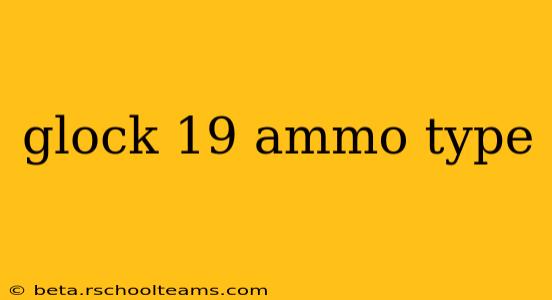The Glock 19 is a hugely popular handgun, known for its reliability and versatility. But choosing the right ammunition is crucial for optimal performance and safety. This guide dives deep into the world of Glock 19 ammo types, helping you make informed decisions based on your needs and shooting style.
Understanding Glock 19 Caliber: 9mm Parabellum
Before we delve into specific ammo types, it's fundamental to understand that the standard Glock 19 chamber is designed for the 9x19mm Parabellum cartridge, often shortened to 9mm. While some aftermarket modifications might allow for other calibers, sticking with the standard 9mm is crucial for reliability and safety. Using the wrong ammunition can lead to serious malfunctions and even injury.
Key Considerations When Choosing Glock 19 Ammo
Several factors influence the best ammo choice for your Glock 19:
1. Intended Use:
- Target Practice: For plinking at the range, cost-effective full metal jacket (FMJ) ammunition is ideal. These rounds are relatively inexpensive and provide consistent performance.
- Home Defense: When it comes to home defense, hollow point (HP) ammunition is often preferred. HP rounds expand upon impact, increasing stopping power. Consider brands known for reliable expansion and consistent performance in self-defense situations. Jacketed Hollow Point (JHP) are a common and popular choice for this application.
- Concealed Carry: Similar to home defense, hollow point ammunition is favored for concealed carry due to its increased stopping power in close-quarters scenarios. Look for rounds designed for reliable expansion even in less-than-ideal conditions.
- Competition: For competitive shooting, precision is paramount. Look for high-quality match-grade ammunition, often featuring tighter tolerances and higher consistency.
2. Grain Weight:
Ammunition is categorized by grain weight, referring to the weight of the projectile (bullet). Common grain weights for 9mm include 115, 124, and 147 grains. Lighter grain weights generally have higher velocity, while heavier grain weights tend to have lower recoil and better accuracy at longer ranges. Experimentation will help you determine your personal preference.
3. Bullet Type:
As mentioned above, bullet type significantly impacts performance. Let's break down the most common types:
- Full Metal Jacket (FMJ): A full metal jacket completely encases the lead core. These are inexpensive, reliable, and good for target practice. However, they have less stopping power than hollow points.
- Hollow Point (HP): The hollow point has a cavity in the tip of the bullet. This design causes the bullet to expand upon impact, increasing stopping power. This is often preferred for self-defense and home defense.
- Jacketed Hollow Point (JHP): A common variation of the hollow point, with a metal jacket over the lead core. This provides good expansion while maintaining projectile stability.
4. Manufacturer Reputation:
Choosing a reputable ammunition manufacturer is essential. Look for brands with a proven track record of producing high-quality, reliable ammunition. Read reviews and seek recommendations from other experienced shooters.
Responsible Gun Ownership: A Crucial Reminder
Remember, responsible gun ownership includes proper training, safe handling, and understanding the legal implications of firearm use. Always consult your local laws and regulations before purchasing or using any ammunition.
This information is for educational purposes only and does not constitute professional advice. Always consult with a qualified firearms instructor for proper training and handling techniques. Safe and responsible gun ownership is paramount.
